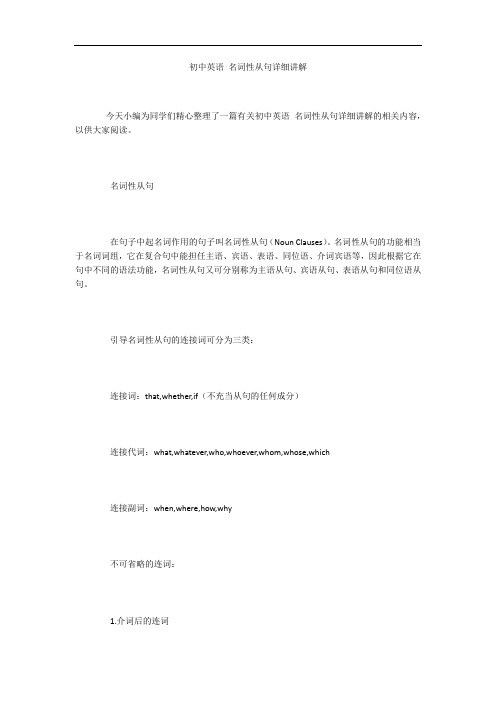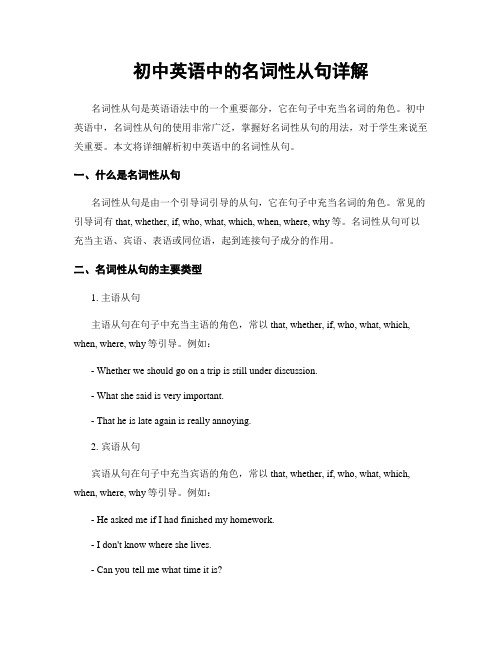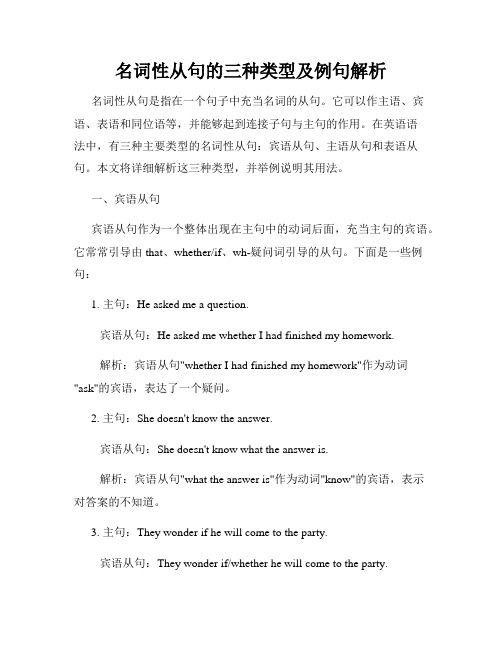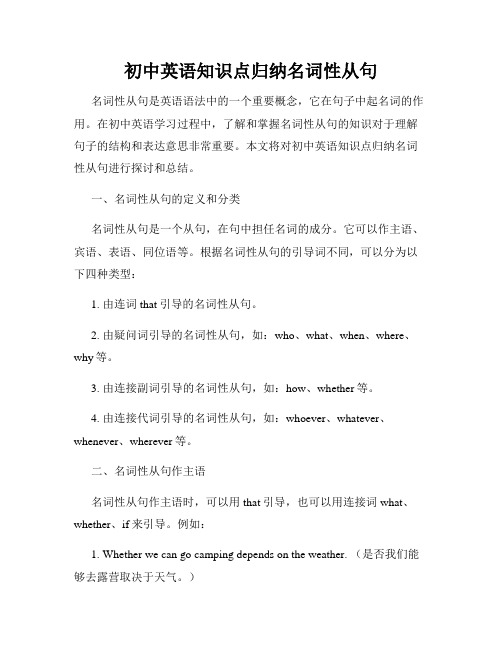初中英语语法名词性从句
初中英语 名词性从句详细讲解

初中英语名词性从句详细讲解今天小编为同学们精心整理了一篇有关初中英语名词性从句详细讲解的相关内容,以供大家阅读。
名词性从句在句子中起名词作用的句子叫名词性从句(Noun Clauses)。
名词性从句的功能相当于名词词组,它在复合句中能担任主语、宾语、表语、同位语、介词宾语等,因此根据它在句中不同的语法功能,名词性从句又可分别称为主语从句、宾语从句、表语从句和同位语从句。
引导名词性从句的连接词可分为三类:连接词:that,whether,if(不充当从句的任何成分)连接代词:what,whatever,who,whoever,whom,whose,which连接副词:when,where,how,why不可省略的连词:1.介词后的连词2.引导主语从句和同位语从句的连词不可省略That she was chosen made us very happy.We heard the news that our team had won.【比较】whether与if均为“是否”的意思。
但在下列情况下,whether不能被if取代:1.whether引导主语从句并在句首2.引导表语从句3.whether从句作介词宾语4.从句后有"or not",例:Whether he will come or not is not clear.大部分连接词引导的主语从句都可以置于句末,用it充当形式主语:It is not important who will go.It is still unknown which team will win the match.今天有关初中英语名词性从句详细讲解的相关内容就介绍到这里了。
名词性从句的用法

名词性从句的用法名词性从句是在句子中充当名词的成分的从句。
名词性从句可以作为主语、宾语、表语或补语,常见的名词性从句有宾语从句、主语从句、表语从句和同位语从句。
1. 宾语从句(Object Clause):宾语从句在主句中充当宾语的角色。
一般引导宾语从句的词包括that, whether, if, why, how, when, where, who, whom 等。
示例:I don't know where he lives.(我不知道他住在哪里。
)2. 主语从句(Subject Clause):主语从句在句子中充当主语的角色。
常用的引导词有that, whether, if, what, who, which, where, how 等。
示例:What she said surprised me.(她说的话让我很惊讶。
)3. 表语从句(Predicate Nominative Clause):表语从句在句子中充当表语的角色。
一般由连词that 或whether 引导,也可以由who, whom, whose, which 等引导。
示例:His dream is that he can become a famous singer.(他的梦想是成为一名著名的歌手。
)4. 同位语从句(Appositive Clause):同位语从句用来解释、说明和限制先行词的意义。
它与先行词之间往往用连词that 或whether 连接。
示例:The news that he had won the prize made everyone happy.(他获奖的消息让大家都很高兴。
)。
初中英语知识点归纳名词性从句和名词性从句的用法区别

初中英语知识点归纳名词性从句和名词性从句的用法区别名词性从句是英语语法中的一个重要部分,它充当名词的作用。
名词性从句分为名词性从句和名词性从句的用法区别。
一、名词性从句的概念和特点名词性从句是一种从句,它在句中担任名词的角色。
名词从句可以作主语、宾语、表语和同位语等。
名词性从句的特点是:1. 由连接词that、whether/if, who, whom, whose, what, which等引导。
2. 可以在主句中作主语、宾语、表语和同位语等。
3. 名词从句不可以独立存在,依附于主句成分的分量。
4. 名词从句既可以作状语,也可以作宾补,修饰动词、形容词或副词。
二、名词性从句的用法1. 名词性从句作主语例如:What you said is true.(你所说的是真的。
)2. 名词性从句作宾语例如:I know that he is a doctor.(我知道他是医生。
)3. 名词性从句作表语例如:My dream is that I can travel around the world.(我的梦想是能环游世界。
)4. 名词性从句作同位语例如:The news that he won the competition made me excited.(他赢得比赛的消息让我兴奋。
)三、名词从句的用法区别名词性从句分为两种:名词性从句和名词性从句。
1. 名词性从句用于陈述句和一般疑问句中,用连接词that引导;而名词性从句多用于特殊疑问句中,用连接词what, which, who, whom, whose等引导。
例如:That he passed the exam pleased his parents.(他通过了考试使他的父母高兴。
)What he said surprised us.(他说的话让我们惊讶。
)2. 名词性从句用于陈述句时,从句中的谓语动词用陈述语气;而名词性从句在特殊疑问句中,从句中的谓语动词用疑问语气。
初中英语中的名词性从句详解

初中英语中的名词性从句详解名词性从句是英语语法中的一个重要部分,它在句子中充当名词的角色。
初中英语中,名词性从句的使用非常广泛,掌握好名词性从句的用法,对于学生来说至关重要。
本文将详细解析初中英语中的名词性从句。
一、什么是名词性从句名词性从句是由一个引导词引导的从句,它在句子中充当名词的角色。
常见的引导词有that, whether, if, who, what, which, when, where, why等。
名词性从句可以充当主语、宾语、表语或同位语,起到连接句子成分的作用。
二、名词性从句的主要类型1. 主语从句主语从句在句子中充当主语的角色,常以that, whether, if, who, what, which, when, where, why等引导。
例如:- Whether we should go on a trip is still under discussion.- What she said is very important.- That he is late again is really annoying.2. 宾语从句宾语从句在句子中充当宾语的角色,常以that, whether, if, who, what, which, when, where, why等引导。
例如:- He asked me if I had finished my homework.- I don't know where she lives.- Can you tell me what time it is?3. 表语从句表语从句在句子中充当表语的角色,常以that, whether, if, who, what, which, when, where, why等引导。
例如:- The problem is whether we can solve it.- His dream is to become a famous singer.- The question is who will be the winner.4. 同位语从句同位语从句在句子中充当同位语的角色,常以that, whether, if, who, what, which, when, where, why等引导。
名词性从句的三种类型及例句解析

名词性从句的三种类型及例句解析名词性从句是指在一个句子中充当名词的从句。
它可以作主语、宾语、表语和同位语等,并能够起到连接子句与主句的作用。
在英语语法中,有三种主要类型的名词性从句:宾语从句、主语从句和表语从句。
本文将详细解析这三种类型,并举例说明其用法。
一、宾语从句宾语从句作为一个整体出现在主句中的动词后面,充当主句的宾语。
它常常引导由that、whether/if、wh-疑问词引导的从句。
下面是一些例句:1. 主句:He asked me a question.宾语从句:He asked me whether I had finished my homework.解析:宾语从句"whether I had finished my homework"作为动词"ask"的宾语,表达了一个疑问。
2. 主句:She doesn't know the answer.宾语从句:She doesn't know what the answer is.解析:宾语从句"what the answer is"作为动词"know"的宾语,表示对答案的不知道。
3. 主句:They wonder if he will come to the party.宾语从句:They wonder if/whether he will come to the party.解析:宾语从句"if/whether he will come to the party"作为动词"wonder"的宾语,表达了对他是否会来参加派对的疑问。
二、主语从句主语从句作为一个整体出现在句子的最前面,充当主句的主语。
它通常由that引导,也可以由wh-疑问词引导。
以下是一些例句:1. 主句:It is important to learn a foreign language.主语从句:That she is a hardworking student is important.解析:主语从句"That she is a hardworking student"作为句子的主语,强调了她是一个勤奋的学生的重要性。
初中英语知识点归纳名词性从句

初中英语知识点归纳名词性从句名词性从句是英语语法中的一个重要概念,它在句子中起名词的作用。
在初中英语学习过程中,了解和掌握名词性从句的知识对于理解句子的结构和表达意思非常重要。
本文将对初中英语知识点归纳名词性从句进行探讨和总结。
一、名词性从句的定义和分类名词性从句是一个从句,在句中担任名词的成分。
它可以作主语、宾语、表语、同位语等。
根据名词性从句的引导词不同,可以分为以下四种类型:1. 由连词that引导的名词性从句。
2. 由疑问词引导的名词性从句,如:who、what、when、where、why等。
3. 由连接副词引导的名词性从句,如:how、whether等。
4. 由连接代词引导的名词性从句,如:whoever、whatever、whenever、wherever等。
二、名词性从句作主语名词性从句作主语时,可以用that引导,也可以用连接词what、whether、if来引导。
例如:1. Whether we can go camping depends on the weather. (是否我们能够去露营取决于天气。
)2. What she said is true. (她所说的是真的。
)3. That he is guilty is beyond doubt. (他有罪是毫无疑问的。
)三、名词性从句作宾语名词性从句常常作及物动词或介词的宾语。
例如:1. I know that you are busy. (我知道你很忙。
)2. He asked me what I wanted. (他问我想要什么。
)四、名词性从句作表语名词性从句作表语时,用that引导。
例如:1. The problem is that we don't have enough time. (问题是我们没有足够的时间。
)2. The fact is that he is leaving tomorrow. (事实是他明天要离开。
名词性从句详解及练习
各类从句详解英语从句可以分为名词性从句、定语从句和状语从句三大类:下面我们逐一进行说明:一、名词性从句(主语从句、表语从句、宾语从句、同位语从句)主语从句、表语从句、宾语从句和同位语从句在复合句中的充当的成分和其名称相同,分别作主句的主语、表语、宾语和同位语。
上述这四种从句均被称为名词性从句。
所有的名词性从句均不能用逗号分开,并且它们都用相同的关联词,关联词如下:①主从连词:that (无意义), whether (是否), if (是否)(在句子中不充当任何成分)②连接代词:who (谁), whom (谁), whose (谁的), what (什么), which (哪一个)③连接副词:when (什么时候), where (什么地方), how (怎样), why (为什么)主从连词只起连接作用,连接代词和连接副词除了起连接作用外,还充当从句某一个成分。
另外,可以用whatever, whichever, whoever, who(m)ever等连接代词引导名词性从句,来加强语气。
下面分别对各种名词性从句进行介绍(一)主语从句(subject clause)在主句中用作主语的主谓结构称之为主语从句。
例如:That he will come to the discussion is certain.他来参加讨论是确定的。
That the moon moves round the earth is well known to all of us.月球绕地球转动,这是我们大家都熟知的。
When the meeting is to be held has not yet been decide.会议什么时候召开还没有决定。
主语从句放在句首,句子常常显得比较笨重,因此通常可以把it放在句首,作形式主语,而将主语从句放在后面。
例如上面的句子可以分别改写为:It is certain that he will come to the discussion.It is well known to all of us that the moon moves round the earth.It has not yet been decide when the meeting is to be held.下面再举一些例句:What they are after is profit.他们追求的是利润。
初中英语语法专题—名词性从句讲解
初中英语语法专题—名词性从句讲解名词性从句是由连接词引导的从句,用作名词的成分,常常在句子中充当主语、宾语、表语、同位语等,起到连接主句与从句的作用。
下面就是名词性从句的不同类型及其用法:主语从句主语从句作为句子的主语部分,通常由连接词 "that" 或"whether" 引导。
例如:- That he is late is not surprising.(他迟到了并不令人惊讶。
)That he is late is not surprising.(他迟到了并不令人惊讶。
)- Whether we can win the game is uncertain.(我们是否能赢得比赛还不确定。
)Whether we can win the game is uncertain.(我们是否能赢得比赛还不确定。
)宾语从句宾语从句作为句子的宾语,通常由连接词 "that" 或 "whether"引导。
例如:- I wonder whether he has finished his homework.(我想知道他是否完成了他的作业。
)whether he has finished his homework.(我想知道他是否完成了他的作业。
)表语从句表语从句用来补充说明主语的性质或状态,通常由连接词"that" 或 "whether" 引导。
例如:- The truth is that he is a good student.(事实是他是个好学生。
)that he is a good student.(事实是他是个好学生。
)- My concern is whether he understands the instructions.(我关心的是他是否理解了这些指示。
)whether he understands the instructions.(我关心的是他是否理解了这些指示。
中考英语语法之名词性从句
中考英语语法之名词性从句名词性从句是英语语法中的重要部分。
它可以充当句子的主语、宾语、表语或补语。
在中考英语考试中,名词性从句经常出现,因此我们必须熟练掌握其基本用法和结构。
本文将详细介绍名词性从句的定义、分类、构成以及常见考点。
一、名词性从句的定义名词性从句是指在句子中充当名词的从句。
它可以独立存在,也可以作为句子的一部分。
名词性从句的引导词有多种形式,如that、whether、if、who、what、which等。
二、名词性从句的分类名词性从句可分为四种类型:主语从句、宾语从句、表语从句和同位语从句。
1. 主语从句主语从句作为句子的主语,通常引导词为that或whether。
例如:- That he is innocent is beyond doubt.(他是无辜的是毫无疑问的。
)- Whether they will come is still uncertain.(他们是否会来还不确定。
)2. 宾语从句宾语从句作为句子的宾语,引导词可以是that、whether、if、who、what、which等。
例如:- I don't know if/whether he will come.(我不知道他是否会来。
)- She asked me what my favorite color was.(她问我最喜欢的颜色是什么。
)3. 表语从句表语从句用来说明主语的身份、性质等,引导词通常是that、whether或连接代词。
例如:- My hope is that they will succeed.(我的希望是他们会成功。
)- The question is whether we should agree or not.(问题是我们是否应该同意。
)4. 同位语从句同位语从句用来解释说明名词的含义或具体细节,通常引导词为that。
例如:- The fact that he passed the exam is not surprising.(他通过了考试这个事实并不令人惊讶。
初中英语语法名词性从句
名词性从句在句子中起名词作用的句子叫名词从句。
名词从句的功能相当于名词词组,名词从句又可分为主语从句、宾语从句、表语从句和同位语从句。
一.主语从句1.作句子主语的从句叫主语从句。
主语从句通常由从属连词that,whether, if和连接代词what, who, which, whatever,whoever以及连接副词how, when, where, why等词引导。
that在句中无词义,只起连接作用。
连接代词和连接副词在句中既保留自己的疑问含义、又起连接作用,在从句中充当从句的成分。
主语从句要求使用陈述句语序。
What surprised me most was that the little girl could play the violin so well.How he was successful is still a puzzle.That he is going aboard made him excited.Where the English party will be held has not yet been announced.注:有时为避免句子头重脚轻,常用形式主语it代替主语从句作形式主语放于句首,而把主语从句置于句末。
主语从句后的谓语动词一般用单数形式。
It is interesting that you like him.It is a pity that you can not go to the party tonight.2.连接词的选用(1)that和what的选用that和what都可引导主语从句。
what除起连接作用外,还在名词性从句中充当某些成分,可作从句的主语、宾语或表语。
而that在名词性从句中不充当任何成分,无词义,只起连接词作用。
What he wants is a book. 他想要的是一本书。
That light travels in straight lines is known to all. 众所周知,光线沿直线运行。
- 1、下载文档前请自行甄别文档内容的完整性,平台不提供额外的编辑、内容补充、找答案等附加服务。
- 2、"仅部分预览"的文档,不可在线预览部分如存在完整性等问题,可反馈申请退款(可完整预览的文档不适用该条件!)。
- 3、如文档侵犯您的权益,请联系客服反馈,我们会尽快为您处理(人工客服工作时间:9:00-18:30)。
名词性从句在句子中起名词作用的句子叫名词从句。
名词从句的功能相当于名词词组,名词从句又可分为主语从句、宾语从句、表语从句和同位语从句。
一.主语从句1.作句子主语的从句叫主语从句。
主语从句通常由从属连词that,whether, if和连接代词what, who, which, whatever,whoever以及连接副词how, when, where, why等词引导。
that在句中无词义,只起连接作用。
连接代词和连接副词在句中既保留自己的疑问含义、又起连接作用,在从句中充当从句的成分。
主语从句要求使用陈述句语序。
What surprised me most was that the little girl could play the violin so well.How he was successful is still a puzzle.That he is going aboard made him excited.Where the English party will be held has not yet been announced.注:有时为避免句子头重脚轻,常用形式主语it代替主语从句作形式主语放于句首,而把主语从句置于句末。
主语从句后的谓语动词一般用单数形式。
It is interesting that you like him.It is a pity that you can not go to the party tonight.2.连接词的选用(1)that和what的选用that和what都可引导主语从句。
what除起连接作用外,还在名词性从句中充当某些成分,可作从句的主语、宾语或表语。
而that在名词性从句中不充当任何成分,无词义,只起连接词作用。
What he wants is a book. 他想要的是一本书。
That light travels in straight lines is known to all. 众所周知,光线沿直线运行。
(2)if和whether的选用引导主语从句,不能用if,只能用whether。
如:Whether we will hold a party in the open air tomorrow depends on the weather.(3)其它连接代词和副词的选用根据主语从句的具体意义,正确的选择who, which, when, where, why, how等连接词,这些连接词既有疑问含义,又起连接作用,同时在从句中充当各种成分。
如:When we shall hold our sports meet is not decided.Who broke the glass yesterday is not clear.Which car you will choose to buy makes no difference.(4)whatever / whoever的功用whatever, whoever在主语从句中不含疑问意义。
它引导主语从句,并在从句中作主语、宾语、表语等。
whatever =no matter what= anything that; whoever = no matter who=anyone who.Whoever breaks the law should be punished. (主语从句)=Anyone who breaks the law should be punished.Whoever breaks the law, he should be punished. (让步状语从句)=No matter who breaks the law, he should be punished.二.宾语从句名词用作宾语的从句叫宾语从句。
引导宾语从句的关联词与引导主语从句表语从句的关联词大致一样,在句中可以做谓语动词或介词及非谓语动词的宾语。
1.由连接词that引导的宾语从句由连接词that引导宾语从句时,that在句中不充当任何成分,在口语或非正式语体中通常可以省略,但如果从句是并列句时,第二个分句前的that不可省。
He has told me that he will go to Shanghai tomorrow.We must never think(that) we are good in everything while others are good in nothing.注:在demand、order、suggest、decide、insist、request、desire、command等表示要求,命令,建议,决定等意义的动词后,宾语从句常用“(should)+动词原形”。
I insist that she (should) do her work alone.The commander ordered that troops (should) set off at once.2.用who,whom,which,whose,what,when,where,why,how,whoever,whatever,whichever等关联词引导的宾语从句相当于特殊疑问句时,注意语序是陈述语序。
I want to know what he has told you.She always thinks of how she can work well.She will give whoever needs help a warm support.3.注意宾语从句中的时态呼应,当主语动词是现在时,从句根据自身的句子情况,而使用不同时态。
I know (that) he will study English next year.(从句用一般现在时)当主句动词是过去时态(could、would除外),从句则要用相应的过去时态,当从句表示的是客观真理,科学原理自然现象,则从句仍然用现在时。
The teacher told me that Tom had left us for America.The teacher told me that the earth goes around the sun.4.think, believe, imagine, suppose, expect等动词引起的否定性宾语从句中,注意否定转移。
We don’t think you are he re.I don’t believe he will do so.三.表语从句在句中作表语的从句叫表语从句。
引导表语从句的关联词与引导主语从句的关联词大致一样,表语从句位于系动词后,有时用as if 引导。
其基本结构为:主语+系动词+that从句。
The fact is that we have lost the game.That’s just what I want.This is where our problem lies.It looks as if it is going to rain.注:当主语是reason时表语从句要用that引导而不是because.The reason why he was late was that he missed the train.四.同位语从句同位语从句说明其前面名词的具体内容。
同位语从句通常由that引导。
The news that our women volleyball team had won the championship.I've come from Mr Wang with a message that he won't be able to see you this afternoon.注:在名词doubt“怀疑”后的同位语从句用whether连接;在no doubt“不怀疑”之后的同位语从句用that连接。
We have some doubt whether they can complete the task on time.There is no doubt that Zhang Wei will keep his promise. 我们相信张卫会守信的。
五、同位语从句与定语从句的用法区别That 作为关系代词可以引导定语从句,充当句子成分,在从句中作宾语时可以省略;that引导同位语从句时,起连词作用,没有实际意义,不充当句子成分,一般不能省。
试比较下面两句话。
I have no idea that you were here.(that 引导同位语从句,不可省)I have you got the idea (that) this book gives you of life in accident Greece.(that引导定语从句,作宾语,可以省)选择:1. _______ is a fact that English is being accepted as an international language.A. ThereB. ThisC. ThatD. It2. _______ what they told me really true?A. HasB. IsC. DoesD. Have3. ____ she couldn't understand was ____ fewer and fewer students showed interestin her lessons.A. What; whyB. That; whatC. What; becauseD. Why; that4._______ we'll go camping tomorrow depends on the weather.A. IfB. WhetherC. ThatD. Where5. -Do you remember _______ he came?-Yes, I do. He came by car.A. howB. whenC. thatD. If6. Would you please tell me _________ next, Mr Wang?A. what should we doB. we should do whatC. what we should doD. should we do what7. You can’t imagine _________ when they received these nice Christmas presents.A. how they were excitedB. how excited they wereC. how excited were theyD. they were how excited8. I want to know ________ you will come back at 8:00 tomorrow.A. thatB. whenC. whereD. Whether9.Every morning the patients are asked if ________ their temperature taken.A. they had hadB. have they hadC. they have hadD. had they had10. It’s up to you to decide _______ you’ll go there, by air or by road.A. howB. whyC. thatD. When11.—I drove to Zhuhai for the air show last week.—Is that ____ you had a few days off? (1999)A. whyB. whenC. whatD. where12.____ she couldn’t understand was ____ fewer and fewer students showed interest in her lessons.A. What; whyB. That; whatC. What; becauseD. Why; that13.The traditional view is ____ we sleep because our brain is “programmed”to make us do so.A. whenB. whyC. whetherD. that14..I had neither a raincoat nor an umbrella ____I got wet through.A. It’s the reasonB. That’s whyC. There’s whyD. It’s how15.See the flags on top of the building? That was ______ we did this morning.A. whenB. whichC. whereD. What16.The fact ____ he was successful proves his ability.A. thatB. whatC. whichD. Why17.His suggestion ____ the meeting be delayed was turned down.A. whichB. thatC./D. it18.I have no idea ____ he will start.A. whenB. thatC. whatD./19.I've come from the government with a message ____ the meeting won't be held tomorrow.A. ifB. thatC. whetherD. which20.The thought ____ he might fail in the exam worried him.A. whenB. whichC. whatD. That答案:1-5DBABA 6-10CBDAC 11-15AADCD 16-20ABABD。
